#15 in the Poetry Potluck Series, celebrating National Poetry Month 2012.
“In Latin America in general, and Cuba in particular, poets have been the inspiration behind struggles for independence, struggles for freedom of all sorts.” ~ Margarita Engle (PW Interview, 2009)
I think most of us will agree that for some things, only poetry will do.
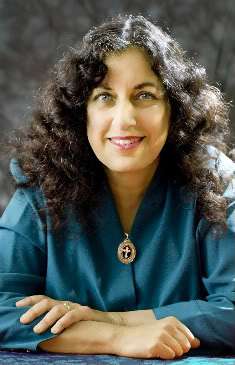 Verse can capture the full range of human emotion in its purest form, distilling its essence for all time. This is what award-winning author Margarita Engle does so brilliantly in her historical novels-in-verse, which I love for their cultural richness, soaring lyricism and enduring power. Each of her books is a work of incomparable beauty, a crystallized portrait of unvarnished truth and harsh realities culled from a complex situation enmeshed in the broader canvas of Cuban history.
Verse can capture the full range of human emotion in its purest form, distilling its essence for all time. This is what award-winning author Margarita Engle does so brilliantly in her historical novels-in-verse, which I love for their cultural richness, soaring lyricism and enduring power. Each of her books is a work of incomparable beauty, a crystallized portrait of unvarnished truth and harsh realities culled from a complex situation enmeshed in the broader canvas of Cuban history.
With just a few strokes, Margarita is able to break your heart at the turmoil and horrors of war and revolution, the social injustices endured by oppressed women, the unspeakable atrocities of slavery. History is personalized, anguish is personified, with her focus on strong role models, individuals in terrible circumstances who have overcome unimaginable obstacles.
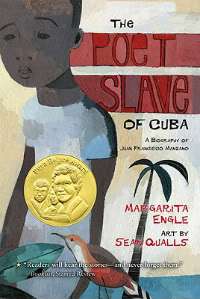 So, we are uplifted and inspired by wilderness nurse Rosa la Bayamesa, who chose to respond with kindness and compassion while her country was being torn apart by successive wars, or by poet slave Juan Francisco Manzano, whose courageous actions and fortitude prove that the heart and imagination can never be suppressed. Ultimately, our faith is restored in the untold resilience and shining beauty of the human spirit. The voices in her poems blend to make unforgettable music — a clear, unfettered song of hope and freedom triumphing over adversity.
So, we are uplifted and inspired by wilderness nurse Rosa la Bayamesa, who chose to respond with kindness and compassion while her country was being torn apart by successive wars, or by poet slave Juan Francisco Manzano, whose courageous actions and fortitude prove that the heart and imagination can never be suppressed. Ultimately, our faith is restored in the untold resilience and shining beauty of the human spirit. The voices in her poems blend to make unforgettable music — a clear, unfettered song of hope and freedom triumphing over adversity.
Today, Margarita has brought a little taste of Cuba, a reminder of happy childhood summers spent visiting her mother’s hometown of Trinidad and her great-uncle’s farm, where she heard her great-grandmother’s and grandmother’s stories, and learned to love nature and the outdoors. These experiences fostered Margarita’s personal attachment to the island that continues to inform most of her work today. Enjoy this tasty sip of her love for family, history, and botany.
Margarita: I love sugar so much that my daughter tells me I have hummingbird blood, saturated with nectar. I also carry the gene for nostalgia, known to Cubans as añoranza. Combine these two dangerous tendencies, and what am I left with? Scent hunger. I love any fruit that smells sweet, especially fragrant tropical fruits that trigger memories of childhood visits to Cuba. Mamey. Mamonsillo. Fruta Bomba. Pineapple. Banana. Coconut. Mango. These are the ingredients my imagination craves.
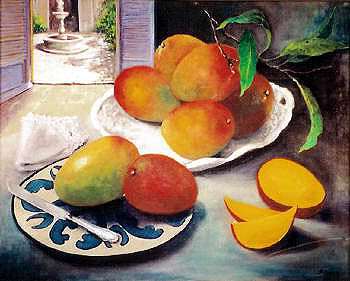
TREASURE
by Margarita Engle
The first mango to reach
my mother’s hometown in Cuba
was purchased with its weight
in gold. Stolen by pirates in 1790,
the sun-rich fruit was lost at sea,
but more mangos were ordered,
the long voyage from India
worth a fortune to my ancestors —
farmers who only needed one seed,
a single, firmly rooted vision
of the future’s
towering trees.
Copyright © 2012 Margarita Engle. All rights reserved.
**************************************************
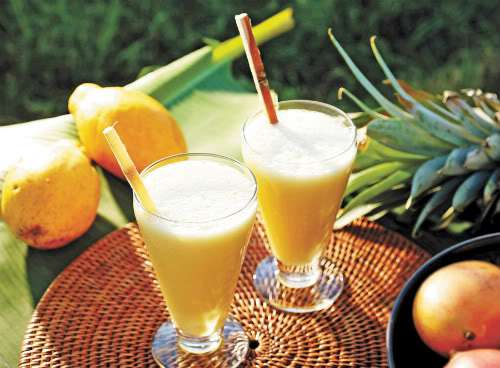
BATIDO (SMOOTHIE):
1 ½ cups milk
2 cups chopped mango
½ cup ice
Puree all ingredients in a blender until smooth. Makes 3 servings.
*Secret Ingredient: Adventure—the fruit we pick ourselves always tastes best!
Tip: Bananas may be substituted for half the fruit to give a richer texture.
Warning: Mangos are in the same botanical family as poison oak. If you are sensitive to poison oak, never touch your lips to a mango peel. Use a knife to skin and chop the fruit, or buy frozen mangos.
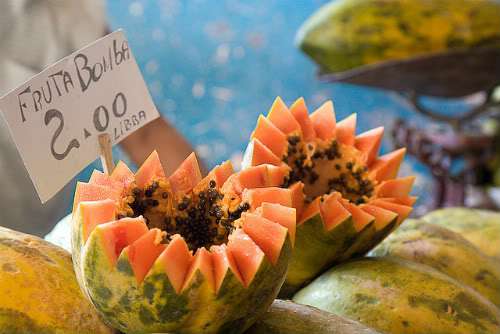
All the bowls, spoons, and cups
are made from gourds, the hard, dry fruit
of a calabash tree that grows near the house
along with every other variety of fruit tree
known in the tropics:
mango, sapote, mamey, tamarind,
and half a dozen different types of bananas,
some tiny, and others huge . . .It is a garden
of delightful scents
and enchanted flavors . . .a garden that somehow
helps me revive
the old hope of rediscovering
lost fragments
of Eden.~ from “Fredrika,” The Firefly Letters by Margarita Engle (Henry Holt, 2010).
**************************************************
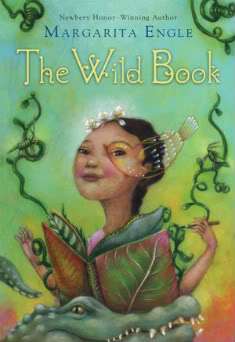
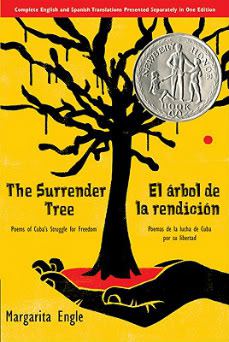
Margarita Engle is the Cuban-American author of The Surrender Tree, which received many awards, including the Newbery Honor, Pura Belpré Medal, Américas Award, and Jane Addams Award. The Poet Slave of Cuba received the Pura Belpré Medal, Américas Award, and an International Reading Association Award. Tropical Secrets received the Sydney Taylor Award, and The Firefly Letters and Hurricane Dancers are both Pura Belpré Honor Books. Engle’s first picture book, Summer Birds, is a Kirkus Best Book for Children. Her most recent novel in verse is The Wild Book (Harcourt, 2012).
Margarita Engle lives in northern California, where she enjoys birdwatching and helping her husband with his volunteer work for wilderness search and rescue dog training programs. Her next picture book, When You Wander (Holt, 2013), is about search and rescue dogs.
***************************************************
♥ Margarita was recently interviewed at Gathering Books (Part I, Part II), and at Sylvia Vardell’s Poetry for Children. She also shared a poem, “Chocho Seeds,” at GottaBooks’ 30 Poets/30 Days.
***************************************************
Previously: Menu/Giveaway/Door Prizes, April Pulley Sayre, Mary Quattlebaum, Helen Frost, Linda Ashman, Gail Gerwin, Martha Calderaro, Kathi Appelt, Robyn Hood Black, Charles Waters, Adele Kenny, Linda Baie, Lesa Medley, Leslie Muir.
—————————————————————
Copyright © 2012 Jama Rattigan of Jama’s Alphabet Soup. All rights reserved.

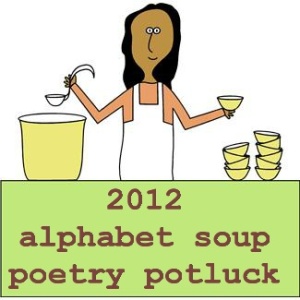
How lovely to see Margarita Engle featured here – and with mangoes to boot! Thank you so much Jama for linking to our interviews with Margarita. Truly very kind of you.
I also wanted to share that growing up in a tropical country, it is safe to say that I grew up with mangoes as staple food on the table. When I was young, I was such a picky eater, that I wouldn’t eat my rice unless it is mixed with yummy mango slices. Now that I live here in Singapore, I do miss that greatly. Absolutely no words for the taste of Philippine mangoes. Should try that smoothie soon! 🙂
LikeLike
I, too, grew up with mangoes — and think Hawaii’s are the best :). We’re very lucky to have had these tropical fruits as part of our staple diets.
We had a delicious mango the other night; sometimes you can luck out, but generally it’s hit and miss here in Virginia.
LikeLike
Wow! I haven’t tasted Hawaii’s mangoes yet, now I’m salivating. Hope I get a chance to taste those ‘bursts of sunshine’ soon – yes, we are truly fortunate to have these tropical fruits as part of our diet. same thing here in Singapore, quite a hit-and-miss thing too.
LikeLike
Thanks, Margarita, for filling our morning with the sweet fragrance of mangoes. Such sensorial poetry, beautiful imagery…
LikeLike
Fruit, specifically mangoes, poetry, and history. What more could I want from a breakfast? Thank you, Jama and Margarita? (I think I have hummingbird blood, too.)
LikeLike
Count me in the hummingbird blood club too (try saying that three times). 🙂
LikeLike
Wow, such richness to come out of – a whole country’s history breathed and lived in poetry. I love the covers of all of Margrita’s books – the Sean Qualls was WONDERFUL, and she is fortunate once again with THE WILD BOOK. Lovely words wrapped in lovely artwork.
And now I want a mango lassi!
LikeLike
I agree on the beautiful covers. Yuyi Morales did a fabulous job with the Wild Book.
LikeLike
Loved this post! I did not know that the mangoes in the Carribean came from India – great poem!
When I moved to Tampa 25 years ago, everyone proudly took me around the city and introduced me to Cuban sandwiches, black beans and rice, cafe con leche – all the favorites. People from all ethnic backgrounds who came there fell in love with the Cuban food.
LikeLike
Lucky you! I have yet to taste all those Cuban specialties, having only gone to one Cuban restaurant in Miami years ago. My other trips to Florida were all Disneyized.
LikeLike
Hummingbird blood? Oh! So that’s her powerful secret. LOVE.
You know that old quote about beer being proof that God loves us and wants us to be happy? I feel the same way about mangos. The taste, the color, even the word itself = joy.
LikeLike
I hear you on the mango love, Sara. And I think your love for them is related to your love of peaches? Golden, juicy sunshine in a single fruit. With mangoes, though, you also feel like dancing :).
LikeLike
Today’s post, like the first poem’s title, is simply a treasure.
“a single, firmly rooted vision
of the future’s
towering trees.”
As we might say in the South, “That’ll preach.” Thank you, Margarita and Jama, for this rich treat. And I’m enjoying the banter in the comments, Myra and Jama, over who has the most flavorful mangoes! You’re all making me hungry.
LikeLike
Like that phrase, Robyn. Must use it sometime to impress dinner guests :). All those tropical fruits are what I miss most about Hawai’i (not counting my family of course). They also have the best papayas and pineapples.
LikeLike
Lovely poem, and I think the children would like that smoothie with their breakfast one of these mornings. I’ve been getting some great mangoes lately from a vendor at our big local farm market.
LikeLike
Hope you make some smoothies for them soon! Maybe M. could add a line to his Breakfast Song about them :).
LikeLike
I have finally read The Poet Slave book because of Myra’s recommendation & loved it. Guess I’ll have to get out the wish list again. Margarita I love that your poem shows that history of the mango in Cuba. I
LikeLike
So sorry, I pressed return & the comment entered! It is a poem for the mango & for Cuba in its long history. I guess I thought all mangoes were the same, but clearly from the conversation above, there are distinct tastes to look for. Thank you Margarita & Jama for such a wonderful post.
LikeLike
My particular favorite of Margarita’s books is The Firefly Letters. You get a good sense of the natural beauty of Cuba.
LikeLike
I was a married woman before I ever tasted a mango. My mother was a good old fashioned Southern cook. She had probably never even heard of the fruit. My husband introduced them to me, but good ones in Georgia are hard to find. Beautiful words. Thanks for this sweetly-scented post, Margarita and Jama.
LikeLike
A good mango, at its peak ripeness, is a wonderful thing :).
LikeLike
Hummingbird blood and the gene for nostalgia. I love it. I’ve read Margarita’s beautiful and oh-so-interesting Summer Birds, and have just reserved a few more of her books from the library. Thank you, Jama, for another week of wonderful posts!
LikeLike
Wonderful food for thought and tummy. Thank you!
LikeLike
Exotic and sensuous. Love all these poem/recipe combos. I’m banqueting!
LikeLike